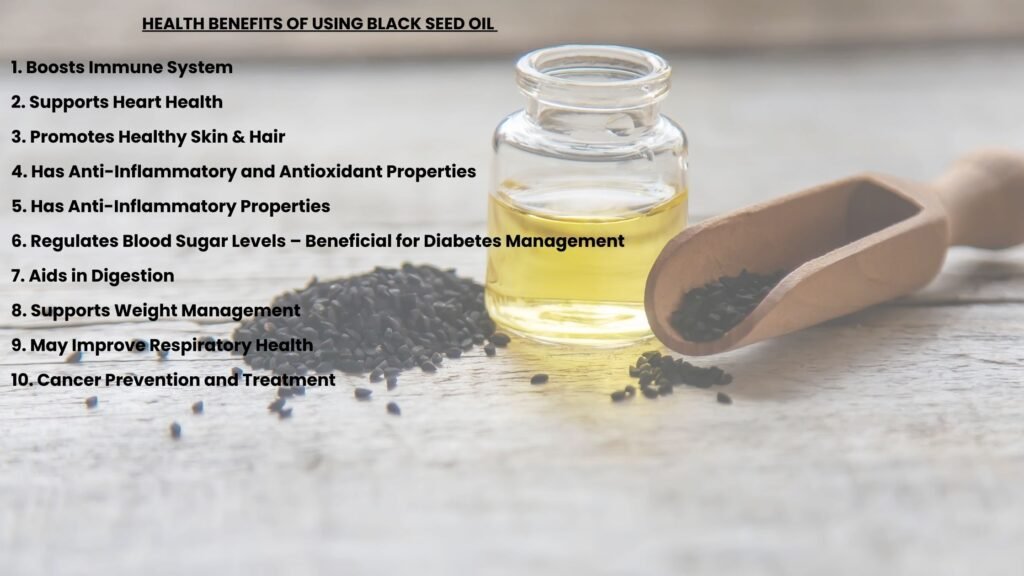Introduction
Black seed oil, extracted from Nigella sativa seeds, is a potent natural remedy with a long history of use spanning centuries. Also known as black cumin seed oil, this ancient ingredient has roots in traditional medicine systems, including Ayurveda, Unani, and Middle Eastern healing practices. It has been revered for its ability to promote overall wellness and treat various ailments.
Historically, black seed oil has been referred to as the “seed of blessing” and was even found in the tomb of King Tutankhamun, highlighting its importance in ancient Egyptian culture. Traditional healers have long used it to boost immunity, support digestion, and enhance skin and hair health. The oil is rich in powerful antioxidants, essential fatty acids, and anti-inflammatory compounds, making it a versatile natural remedy.
In this article, we will explore the key benefits and uses of black seed oil, highlighting how this remarkable oil can support your health and well-being. Whether you’re looking to improve heart health, aid digestion, enhance skin and hair, or reduce inflammation, black seed oil may be the natural solution you need. Keep reading to discover how you can incorporate this ancient remedy into your daily routine!
What is Black Seed Oil?
Black seed oil is extracted from the Nigella sativa plant, a small flowering herb found in Southwest Asia, the Middle East, and certain regions of Africa.The seeds of this plant, commonly known as black cumin, black caraway, or kalonji, have been used for thousands of years in traditional medicine for their powerful healing properties.
Nutrient-Rich Composition
Black seed oil is rich in essential nutrients that provide a wide range of health benefits, including:
Thymoquinone (TQ) – A potent antioxidant and anti-inflammatory compound.
Essential fatty acids (omega-3, omega-6, omega-9) – Support heart health and skin nourishment.
Vitamins (A, B, C, and E) – Help boost immunity and improve skin health.
Minerals (zinc, iron, calcium, potassium, and magnesium) – Support overall body function.
Chemical Composition and Nutrition of Black Seed
Black seed, also known as Nigella sativa, is a nutritional powerhouse packed with a variety of essential nutrients and bioactive compounds. These tiny seeds are a rich source of fixed oil, comprising 32-40% of their content, which includes a wealth of unsaturated fatty acids such as arachidonic acid, eicosadienoic acid, linoleic acid, oleic acid, palmitic acid, stearic acid, and myristic acid. These fatty acids are crucial for maintaining heart health, reducing inflammation, and supporting overall wellness.
In addition to the fixed oil, black seeds contain a volatile oil (0.4-2.45%) that is abundant in bioactive compounds like Nigellone, thymoquinone, thymohydroquinone, ditimoquinone, thymol, karva-krol, α and β-pinene, d-limonene, d-citronellol, and p-cimene. These compounds contribute to the seeds’ potent antioxidant, anti-inflammatory, and antimicrobial properties, making them a promising natural remedy for various health conditions.
Beyond their oil content, black seeds are also a good source of protein, carbohydrates, alkaloids, saponins, and essential oils. They are rich in vitamins and minerals, including vitamin A, vitamin B, vitamin C, calcium, iron, magnesium, and potassium. This impressive nutritional profile supports the seeds’ traditional use in treating a range of ailments, from digestive issues and respiratory problems to skin conditions.
The combination of these nutrients and bioactive compounds makes black seeds a versatile and powerful addition to any health regimen. Whether consumed as black seed oil or in their whole form, these seeds offer a multitude of health benefits that have been celebrated for centuries.
How is Black Seed Oil Extracted?
Black seed oil is typically extracted using cold-pressing, a method that preserves the oil’s natural compounds without heat or chemicals. This process ensures that the oil retains its nutrients, potency, and purity, making it highly effective for medicinal and cosmetic use.
Common Uses of Black Seed Oil
Black seed oil is incredibly versatile and can be used in various ways:
Oral consumption – Taken as a supplement in liquid form or capsules for overall wellness.
Topical application – Applied directly to the skin or hair to promote health and nourishment.
Aromatherapy – Used in essential oil blends for relaxation and respiratory support.
Cooking ingredient – Occasionally added to certain dishes for its rich, earthy flavor.
With its powerful healing properties, black seed oil has become a staple in natural health routines, helping people improve their immune function, skin health, digestion, and more. In the following sections, we will explore the key benefits of black seed oil and how it can enhance your overall well-being.
History and Traditional Use of Black Seeds
Black seeds, also known as Nigella sativa, have a rich history that spans centuries and cultures. These tiny seeds have been revered in ancient texts, including the Bible and the Quran, for their potent medicinal and spiritual properties. In traditional Arabic medicine, black seeds were famously described as a “cure for all diseases except death,” underscoring their esteemed status as a promising natural remedy.
In the realm of Ayurveda, black seeds were utilized to address a variety of health issues such as fever, rheumatism, and skin diseases. They were also a go-to solution for hair loss and skin conditions, thanks to their natural antiseptic and antibiotic properties. Traditional Indian medicine also embraced black seeds for treating respiratory ailments like bronchitis, asthma, and allergies.
The legacy of black seeds in traditional medicine has been passed down through generations, and their use continues to thrive in many parts of the world today. Often combined with other herbs and spices, black seeds are celebrated for their ability to enhance overall health and well-being. Whether used to soothe digestive issues, alleviate respiratory problems, or improve skin health, black seeds remain a cornerstone of natural healing practices.
Key Health Benefits of Black seed oil

1. Boosts Immune System
Black seed oil is widely recognized for its immune-boosting properties, making it a powerful natural remedy for strengthening the body’s defense system. Rich in antioxidants, vitamins, and essential fatty acids, it helps protect cells from damage and supports overall immunity. The key compound thymoquinone (TQ) has potent anti-inflammatory, antibacterial, and antiviral properties, which help the body fight infections more effectively. Regular consumption of black seed oil can aid in reducing inflammation, protecting against harmful pathogens, and enhancing the production of white blood cells, which are essential for a strong immune response. Whether taken as a supplement or added to herbal teas, black seed oil can be a natural way to support immune health and prevent common illnesses like colds and flu.
2. Supports Heart Health
Black seed oil is known for its heart-protective benefits, helping to regulate both blood pressure and cholesterol levels. The active compound thymoquinone has been shown to support healthy circulation, reducing strain on the heart and promoting overall cardiovascular health. Studies suggest that black seed oil may help lower LDL (bad) cholesterol while increasing HDL (good) cholesterol, which is essential for maintaining balanced cholesterol levels. Additionally, its anti-inflammatory and antioxidant properties can help protect blood vessels from damage, reducing the risk of hypertension and heart disease. By incorporating black seed oil into your routine, whether through supplements or as an ingredient in meals, you may naturally support a stronger, healthier heart.
3. Promotes Healthy Skin & Hair
Black seed oil is widely known for its powerful skincare and haircare benefits. Rich in antioxidants, essential fatty acids, and antimicrobial properties, it helps combat acne, eczema, and other skin conditions by reducing inflammation and soothing irritation. The oil’s moisturizing properties keep the skin hydrated, soft, and glowing, while its antibacterial effects help prevent breakouts and clogged pores.
For hair health, black seed oil nourishes the scalp, strengthens hair follicles, and helps reduce dandruff and hair loss. It also promotes shinier, thicker, and healthier hair growth by stimulating circulation in the scalp. Whether applied directly to the skin, mixed with a carrier oil for hair treatments, or used in DIY face masks, black seed oil is a natural remedy for maintaining radiant skin and strong, healthy hair.
4. Has Anti-Inflammatory and Antioxidant Properties
Black seed oil is renowned for its potent anti-inflammatory and antioxidant properties, which play a crucial role in protecting the body against a variety of health conditions. Central to these benefits is thymoquinone, a powerful bioactive compound found in black seed oil. Thymoquinone has been extensively studied for its ability to reduce inflammation and oxidative stress, making it a key player in the oil’s health-promoting effects.
Research has shown that black seed oil can help mitigate inflammation and oxidative damage in the body, which are underlying factors in many chronic conditions such as arthritis, diabetes, and heart disease. By reducing these harmful processes, black seed oil may help protect against the development and progression of these diseases. Additionally, its anti-tumor and anti-cancer properties suggest that black seed oil could play a role in cancer prevention and treatment.
Beyond its anti-inflammatory and antioxidant effects, black seed oil also boasts antimicrobial and antifungal properties. These attributes make it effective in combating infections and promoting wound healing. The oil’s antiseptic and antibiotic properties further enhance its ability to protect and heal the skin, making it a valuable addition to natural skincare routines.
Incorporating black seed oil into your daily regimen can provide a natural way to support your body’s defenses against inflammation, oxidative stress, and infections. Whether taken internally or applied topically, black seed oil offers a holistic approach to maintaining and improving overall health.
5. Has Anti-Inflammatory Properties
Black seed oil is well-known for its powerful anti-inflammatory effects, making it a natural remedy for joint pain, swelling, and muscle discomfort. It contains thymoquinone, a potent compound that helps reduce inflammation in the body and may provide relief for individuals suffering from arthritis, rheumatism, and other inflammatory conditions.
Regular use of black seed oil can ease stiffness, improve mobility, and support overall joint health. It can be taken orally as a supplement or applied topically as a massage oil to soothe sore muscles and aching joints. Its natural pain-relieving properties make it a great alternative for those looking for holistic ways to manage inflammation without relying on synthetic medications.
6. Regulates Blood Sugar Levels – Beneficial for Diabetes Management
Black seed oil has been shown to help maintain healthy blood sugar levels, making it beneficial for those managing diabetes or insulin resistance. It contains active compounds like thymoquinone, which can improve insulin sensitivity and reduce blood sugar spikes after meals.
Studies suggest that regular consumption of black seed oil may support glucose metabolism, lower fasting blood sugar levels, and reduce the risk of diabetes-related complications. Additionally, it may help prevent sudden fluctuations in blood sugar, which is crucial for maintaining energy levels and overall well-being.
For best results, black seed oil can be taken as a daily supplement or mixed with warm water and honey for a natural blood sugar-balancing remedy. However, individuals with diabetes should consult their doctor before incorporating it into their routine, especially if they are taking medications for blood sugar control.
7. Aids in Digestion
Black seed oil has been used for centuries as a natural digestive aid, helping to soothe the stomach and promote better digestion. It contains anti-inflammatory and carminative properties, which help reduce bloating, gas, and discomfort caused by indigestion.
The active compound thymoquinone in black seed oil has been shown to support gut health by reducing inflammation in the digestive tract. It may also stimulate digestive enzymes, making it easier for the body to break down food and absorb nutrients efficiently.
Additionally, black seed oil may help relieve symptoms of acid reflux, constipation, and stomach cramps by supporting the natural balance of gut bacteria. To improve digestion, it can be taken before meals in small amounts or mixed with warm water and honey. Regular consumption may lead to a healthier gut and reduced digestive discomfort.
8. Supports Weight Management
Black seed oil may be a natural aid for weight management due to its ability to boost metabolism and support fat loss. The active compound thymoquinone has been studied for its anti-obesity effects, helping the body break down fats more efficiently and prevent fat accumulation.
Additionally, black seed oil may support appetite control, reducing cravings and promoting a feeling of fullness, which can help with portion control and mindful eating. Its anti-inflammatory properties also play a role in weight management by reducing inflammation-related weight gain and improving overall metabolic function.
Regular consumption of black seed oil, along with a healthy diet and exercise, may help improve energy levels, digestion, and fat-burning processes, making it a useful addition to a weight management routine. Many people choose to take it in the morning on an empty stomach or mix it into smoothies, tea, or warm water for best results.
9. May Improve Respiratory Health
Black seed oil has long been used as a natural remedy to support respiratory health, helping with conditions like asthma, bronchitis, and seasonal allergies. Its powerful anti-inflammatory and antihistamine properties help reduce airway inflammation, making breathing easier for individuals with asthma. The active compound thymoquinone works by relaxing bronchial muscles, which can help prevent asthma attacks and improve lung function.
Additionally, black seed oil has antimicrobial properties that may help combat respiratory infections, coughs, and congestion. It can also reduce mucus buildup, providing relief from sinus congestion and seasonal allergies.
To support respiratory health, black seed oil can be taken orally in small amounts or mixed with honey and warm water. Some people also inhale black seed oil steam by adding a few drops to hot water to help clear nasal passages and ease breathing.
10. Cancer Prevention and Treatment
Emerging research suggests that black seed oil may hold promise in the realm of cancer prevention and treatment. Central to its potential anti-cancer properties is thymoquinone, a powerful compound found in black seed oil. Thymoquinone has demonstrated anti-tumor and anti-cancer effects in various studies, making black seed oil a subject of interest for its potential role in combating cancer.
Studies indicate that black seed oil may help reduce the growth of cancer cells and inhibit their spread. Its anti-inflammatory properties further contribute to its potential in lowering cancer risk. By reducing inflammation, black seed oil may create a less favorable environment for cancer cells to thrive.
While black seed oil shows promise, it is essential to approach its use with caution and under the guidance of a healthcare professional. It should not replace conventional cancer treatments but can be considered as a complementary therapy to enhance the effectiveness of treatments like chemotherapy and radiation.
In addition to its potential anti-cancer benefits, black seed oil offers a range of other health advantages. Its antiseptic and antibiotic properties make it effective in treating wounds and skin conditions, while its ability to reduce inflammation and improve immune function supports overall health.
As a promising natural remedy, black seed oil continues to be the focus of ongoing research. While more studies are needed to fully understand its benefits and risks, its potential in cancer prevention and treatment adds to the growing list of health benefits associated with this remarkable oil.
How to Use Black Seed Oil
1. Recommended Daily Intake (Dosage Tips)
The typical recommended dose for general health benefits is ½ to 1 teaspoon per day.
If using capsules, follow the dosage instructions provided on the product label.
For specific health concerns, consult a healthcare professional for the appropriate dosage.
2. How to Apply It Topically for Skin and Hair Benefits
For Skin: Apply a few drops directly to acne, eczema, or dry skin areas for hydration and healing. Mix with a carrier oil like coconut or jojoba oil for sensitive skin.
For Hair: Massage into the scalp to nourish hair follicles, promote growth, and reduce dandruff. Leave it on for at least 30 minutes before washing or overnight for deeper conditioning.
3. Ways to Consume Black Seed Oil
Raw Oil: Take it directly by spoon or mix with honey, lemon juice, or warm water for easier consumption.
In Food or Drinks: Add a few drops to smoothies, yogurt, soups, or salad dressings for an extra health boost.
Capsules: An easy option for those who prefer a tasteless and convenient way to take black seed oil.
For the best results, use black seed oil consistently as part of your daily routine!
Additional Tips for Choosing Quality Black Seed Oil
1. Importance of Cold-Pressed and Organic Black Seed Oil
Cold-Pressed: Always choose cold-pressed black seed oil to preserve its nutrients and potency. Heat extraction can destroy beneficial compounds.
Organic Certification: Opt for organic black seed oil to ensure it’s free from pesticides, additives, and harmful chemicals.
2. How to Identify Pure, High-Quality Black Seed Oil
Dark Amber or Black Color: High-quality black seed oil should have a rich, dark color—not too light or diluted.
Strong, Peppery Aroma: Authentic black seed oil has a strong, slightly bitter scent due to its powerful active compounds.
Glass Packaging: Look for oil stored in dark glass bottles to protect it from light and oxidation. Avoid plastic packaging, which may degrade the oil.
Check the Ingredients: The label should list 100% pure Nigella Sativa oil with no additives or fillers.
Reputable Brands: Buy from trusted brands with third-party testing to ensure quality and authenticity.
By choosing pure, high-quality black seed oil, you can maximize its health benefits and ensure you’re getting a safe and effective product!
Precautions and Possible Side Effects of Black Seed Oil
While black seed oil offers many health benefits, it’s important to use it safely and be aware of possible side effects and interactions.
1. Who Should Avoid or Limit Black Seed Oil Intake
Pregnant Women: Black seed oil may cause uterine contractions, which could be risky during pregnancy.
People with Low Blood Pressure: Since black seed oil may help lower blood pressure, those with hypotension should use it cautiously.
Individuals with Bleeding Disorders: Black seed oil may slow blood clotting, increasing the risk of excessive bleeding.
2. Possible Interactions with Medications
Diabetes Medications: Black seed oil may help regulate blood sugar levels, so if you’re on medication for diabetes, consult a doctor to avoid low blood sugar (hypoglycemia).
Blood Thinners & Anticoagulants: Since black seed oil may reduce blood clotting, it could interact with medications like aspirin or warfarin, increasing the risk of bleeding.
Blood Pressure Medications: If you’re taking medication for high blood pressure, black seed oil may enhance its effects, leading to dangerously low blood pressure.
3. Safe Usage Guidelines
Start with a small dose (½ to 1 teaspoon per day) and gradually increase if tolerated.
Do not exceed recommended dosages—excessive intake may cause nausea, dizziness, or digestive discomfort.
For topical use, always perform a patch test to check for allergic reactions before applying it to larger areas of the skin.
Consult a healthcare professional before using black seed oil if you have chronic conditions or take prescription medications.
By following these precautions and usage guidelines, you can enjoy the benefits of black seed oil safely and effectively!
Conclusion
Black seed oil has been valued for centuries for its powerful health benefits. From boosting immunity and supporting heart health to improving skin, hair, and digestion, this natural remedy offers a wide range of wellness advantages. Its anti-inflammatory properties, ability to regulate blood sugar, and potential to aid in weight management make it a great addition to a healthy lifestyle.
If you’re looking for a natural solution to support overall wellness, black seed oil is worth exploring. Whether consumed internally, applied topically, or used in daily routines, its benefits are backed by both traditional wisdom and modern research.




